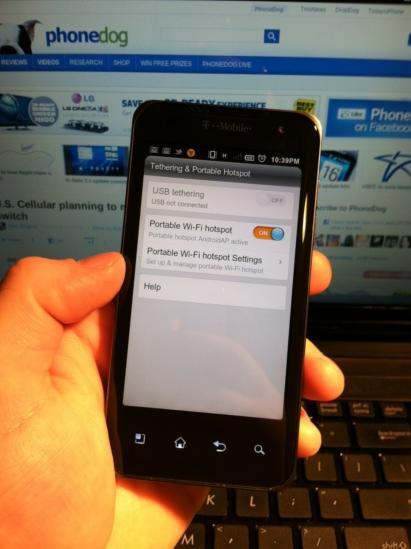
The days of limitless wireless data are coming to an end, quickly. AT&T was the first to take the tiered plunge, followed by T-Mobile and Verizon, leaving Sprint as the only major national carrier that still offers unlimited data. It was only a matter of time before the regional carriers, too, began to make the transition. Earlier today, it was revealed that U. S. Cellular has plans to make the transition to tiered data in the next two to three quarters.
In light of this capped data fiasco that we've been hearing about over the past year, one more important issue has come to surface: tethering. For those of you who don't know, tethering is using the wireless radio in your cell phone (either by physically connecting the two via USB or creating a wireless hotspot with your phone) as a means to share a data connection with another web-capable device. For instance, I use my cell phone as a hotspot for my Galaxy Tab when I'm out and about from time to time. I have even used my phone to connect to the Internet through power outages at home – it has saved me from several would-be missed assignments in school.
Unfortunately, tethering is a service that carriers charge for and as of late, they've been cracking down on unauthorized means of tethering. AT&T (no surprise there) was the first to actively take a stand against these tethering hijackers, threatening to automatically charge the tethering fee to those who partake. Not only that, they have also threatened to remove grandfathered, unlimited data plans and replace them with a tiered plan and also charging the tethering fee. Verizon has also jumped on the tethering “ban-wagon” as BGR calls it. A reader of ReadWriteWeb was using a “jailbroken tethered Verizon Motorola X” ( wow … seriously?) and an unauthorized third-party tethering app – in place of Verizon's paid mobile hotspot. Instead of being able to freely browse the web as usual, the report states the reader was blocked from browsing the web and was redirected to a web page detailing Verizon's prices for the official mobile hotspot feature.
The validity of the claims are ... well, unknown, and I am not exactly sure how Verizon would or could intercept a third-party tethering app. But the bottom line is, I'm not at all surprised or doubtful of the story. I am, however, taken aback by the whole ordeal.
Wireless providers have indefinitely removed their unlimited data offerings, stuck users with outrageously expensive, tiered data plans and now they want to limit how we use said data. How a user consumes the data they pay for should be trivial to the carriers; they make their money either way. I understand that their networks are taking a beating, but we are not at fault. Carriers have relentlessly pushed smartphones and data onto customers, making cheaper, less advanced options as dissuading as possible with data requirements, cheap hardware and poor device selections. They then waited until the bandwidth crisis got out of hand before taking any action against it. They have created this mess themselves and should be reaping what the sow.
Despite all of that, we, the hard working, paying customers are the ones taking the blunt end of the blow. The truth is plain and simple. Tethering is a built-in feature of most phones. Carriers remove the feature (or simply fail to include it) with their customized software. Upon paying their fee for the feature, it is then available to the customer (much like GPS, prior to Google Navigation on Android). Wireless providers are hindering the evolution of data consumption and nickel-and-diming us along the way.
If grandfathered, unlimited data users want to tether, they should be required to move to a tiered data plan. You can't have the best of both worlds. Those with existing data caps, on the other hand, should not be forced to pay extra to simply use data – they are already paying for – on another device. What does it matter? If the user is on a tiered data plan and tethering, they will likely eat through their data more quickly, resulting in an overage fee. Charging for tethering and forcing tiered data on users is simply a roundabout way for carriers to double dip.
Customers can't take every hit along the way. At some point, there is going to have to be a compromise on the carriers' part. So who will it be? Which carrier will be the first to do the right thing? One thing is for sure. I won't be holding my breath ...
(Phew, end rant.)